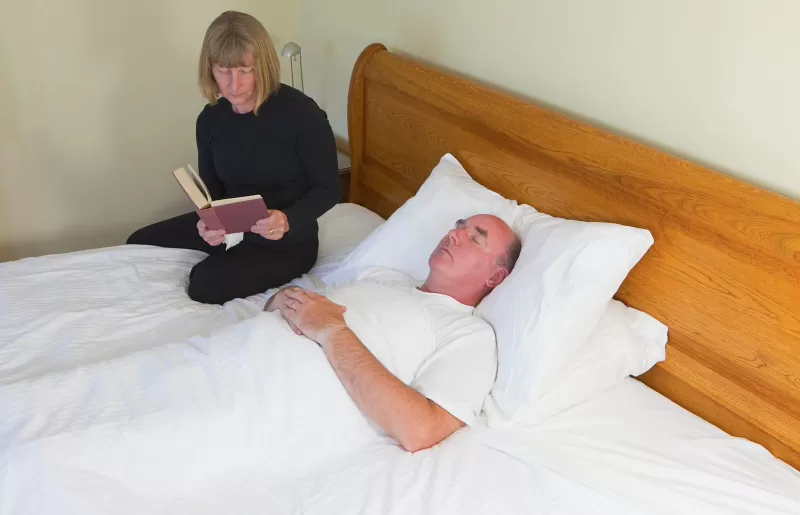Hours Before Death Symptoms - Recognizing End-of-Life Signs In Loved Ones
Hours before death symptoms refer to the physical and emotional changes that occur in a person's body during the final hours or days of their life. These symptoms can vary from person to person, but there are some common changes that are often seen in individuals who are nearing the end of their lives.
Author:Hajra ShannonReviewer:Paula M. GrahamMar 28, 20232 Shares224 Views

Hours before death symptomsrefer to the physical and emotional changes that occur in a person's body during the final hours or days of their life.
These symptoms can vary from person to person, but there are some common changes that are often seen in individuals who are nearing the end of their life.
Understanding these symptoms can be helpful for both the person who is dying and their loved ones, as it can help them prepare and provide appropriate care during this difficult time.
The last hours before death can be a difficult time for both the dying person and their loved ones. As the body begins to shut down, there are several physical and emotional changes that can occur, indicating that death is near.
Recognizing and understanding these changes can help families prepare for what is to come and provide comfort to their loved ones.
In this article, we will discuss the common hours before death symptoms and what they may indicate.
Understanding The Process Of Dying
The process of dying can be a difficult and emotional experience for both the dying individual and their loved ones.
Understanding the physical, emotional, and spiritual changes that can occur during the hours before death can help to alleviate some of the fear and uncertainty surrounding this process.
It is important to note that not all individuals will experience the same physical, emotional, or spiritual changes during the hours before death.
Each person's experience will be unique, and may be influenced by a variety of factors, including their medical condition, personal beliefs, and support system.
Despite the challenges that can arise during the dying process, it is possible to find peace and comfort in the final hours of life.
Palliative care and hospice services can provide specialized support to individuals and their loved ones during this time, helping to manage physical symptoms, provide emotional support, and facilitate spiritual connection and reflection.
By understanding the process of dying and the changes that can occur during the hours before death, individuals and their loved ones can be better prepared to navigate this difficult time with compassion, grace, and dignity.
What Are The Hours Before Death Symptoms?
Physical Symptoms
1. Cooling Of The Extremities
As the body's circulation slows down, the hands, feet, and legs may become cold to the touch. This is because blood is being redirected to the vital organs in the body, such as the heart and brain, in an effort to keep them functioning.
2. Decreased Urine Output
As the body begins to shut down, the kidneys may stop producing urine, or the amount of urine produced may decrease significantly.
3. Changes In Breathing
The dying person's breathing may become irregular, shallow, or labored. They may also have periods where they stop breathing altogether, which is known as Cheyne-Stokes breathing.
4. Changes In Skin Color
The skin may become pale or take on a bluish hue as a result of decreased circulation.
5. Increased Drowsiness
The dying person may become increasingly drowsy or lethargic as their body begins to shut down. They may sleep for longer periods or be difficult to wake up.
Emotional And Spiritual Symptoms
1. Withdrawal
As death approaches, the dying person may begin to withdraw from social interactions and become less responsive to their environment. This is a natural part of the dying process and should not be interpreted as a lack of interest or affection.
2. Increased Spiritual Awareness
Many dying people experience a heightened sense of spiritual awareness as death approaches. They may speak of seeing deceased loved ones or religious figures, or of having a sense of peace and acceptance.
3. Emotional Distress
The dying person may experience a range of emotions, including fear, sadness, and anxiety, as they come to terms with their impending death. They may also experience physical pain or discomfort, which can exacerbate their emotional distress.
4. Life Review
As death approaches, many people engage in a process of life review, in which they reflect on their life experiences and relationships. This can be a source of comfort and meaning for the dying person.
5. Acceptance
In the final hours before death, many people reach a state of acceptance and peace. They may express a desire to be left alone or to spend time with loved ones. It is important to respect their wishes and provide comfort and support in whatever way is most meaningful to them.
How To Provide Comfort To Someone In Their Final Hours
As a loved one approaches the end of their life, it's important to provide comfort and support in whatever way you can. This may include:
- Offer hydration- Offer the person sips of water or ice chips if they are able to swallow. This can help keep their mouth and throat moist and comfortable.
- Respect their wishes- If the person has expressed specific wishes for their final hours, do your best to honor them. This can include playing certain music, having specific family members present, or ensuring certain religious or cultural practices are followed.
- Ensuring That The Person Is Comfortable - Making sure that the person is positioned comfortably and has access to pain relief medication can help to minimize discomfort.
- Offering Reassurance And Emotional Support - Letting the person know that they are loved and that you are there to support them can help to provide comfort and reduce anxiety. Hold their hand, speak softly and calmly, and let them know they are loved and not alone. You can also play soft music or read to them if they are able to hear.
- Providing Physical Comfort - Holding the person's hand, stroking their hair, or simply being present can be a source of comfort for both the dying person and their loved ones.
- Allowing The Person To Dictate The Level Of Social Interaction - Some people may want to be surrounded by loved ones in their final hours, while others may prefer to be alone. It's important to respect the dying person's wishes and allow them to dictate the level of social interaction.

6 SIGNS YOUR DEATH HAS COME SO NEAR
People Also Ask
What Are The Common Symptoms That Occur In The Hours Before Death?
Common symptoms that occur in the hours before death include decreased blood pressure, changes in breathing patterns, changes in body temperature, increased restlessness or agitation, and changes in urine output.
Can The Symptoms That Occur In The Hours Before Death Be Managed?
Yes, the symptoms that occur in the hours before death can be managed through palliative care, which focuses on improving the quality of life for patients with serious illnesses. Medications may be given to manage pain, nausea, and other symptoms.
How Long Can A Person Exhibit Symptoms Before Dying?
The length of time a person exhibits symptoms before dying can vary greatly depending on the underlying condition. Some individuals may exhibit symptoms for weeks or months before passing away, while others may exhibit symptoms for only a few hours.
What Is The "Death Rattle"?
The "death rattle" is a term used to describe the sound that is often heard when a dying person is breathing. It is caused by a buildup of mucus or fluid in the lungs, and is not typically painful for the person.
What Can Family Members Do To Support A Loved One In The Hours Before Death?
Family members can support a loved one in the hours before death by providing comfort and reassurance, ensuring that the person is as comfortable as possible, and spending time with them. It can also be helpful to contact a hospice or palliative care team for additional support and guidance.
Final Words
Understanding the hours before death symptoms can provide important information about the physical and emotional changes that a person may experience as they near the end of their life.
While these symptoms can be distressing for both the person who is dying and their loved ones, being aware of what to expect can help individuals better prepare for and cope with the dying process.
It's important to remember that everyone's experience is unique, and not all individuals will exhibit every symptom.
However, being aware of these common symptoms can help individuals provide appropriate care and support during this difficult time.

Hajra Shannon
Author

Paula M. Graham
Reviewer
Latest Articles
Popular Articles